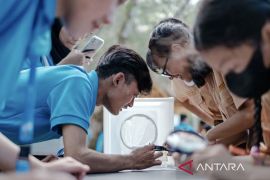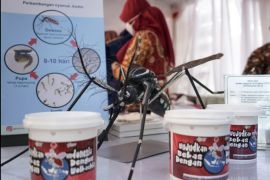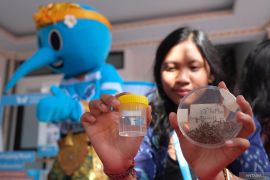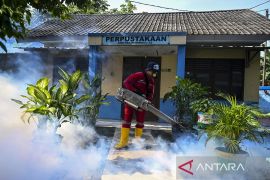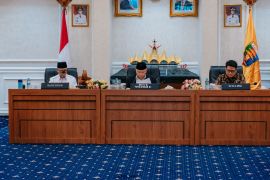The strategy is considered a new hope to fight the threat of the disease. With this method, Jakarta is aiming to stop the cycle of dengue and build a safer and more healthy city for everyone.
Head of the Jakarta Health Office Ani Ruspitawati noted that there was a sharp surge in dengue fever cases around March to May 2024. This year, Jakarta has recorded more than 12 thousand cases of dengue fever as of September.
Therefore, the health office has decided on the Wolbachia method, in line with the Health Minister's Decree Number 1341 on the implementation of the method as a dengue handling innovation.
Under the plan, mosquitoes containing Wolbachia are planned to be released on October 4, 2024, starting from North Kembangan Village, Kembangan Sub-district, West Jakarta.
According to Ruspitawati, West Jakarta has been selected as the first location because the number of dengue cases there is the highest compared to other regions.
Director of the Center for Tropical Medicine at the Faculty of Medicine, Public Health, and Nursing Riris Andono Ahmad explained that Wolbachia bacteria are natural bacteria that live in insects.
The bacteria live in several insects, such as flies, mosquitoes, butterflies, and dragonflies. The way these insects reproduce can also affect the bacteria or vice versa.
If a male insect containing Wolbachia mates with a female insect that does not contain Wolbachia, their eggs do not hatch. Thus, the Wolbachia method can control the mosquito population.
However, if a female insect contains Wolbachia or when both the male and female insects contain Wolbachia, the bacteria is passed on to their offspring.
Inside the body of Aedes aegypti mosquitoes, the bacteria can check the replication of the dengue virus.
Thus, if almost all Aedes aegypti mosquitoes contain Wolbachia, their ability to transmit the dengue virus will decline.
Experts have assured that the method is safe, environmentally friendly, and sustainable. This is different from the use of chemicals to tackle the spread of the virus as that can cause impacts that are not environmentally friendly or sustainable.
The Jakarta Health Office has assured that Wolbachia bacteria do not transmit from Aedes aegypti mosquitoes to humans.
The office's acting head of disease prevention and control, Maryati Kasiman, explained that the eggs of an Aedes aegypti mosquito with Wolbachia are not transmitted through its proboscis.
Therefore, humans bitten by an Aedes aegypti mosquito with Wolbachia do not contract any specific disease.
According to Kasiman, Aedes aegypti mosquitoes with Wolbachia look the same as Aedes aegypti mosquitoes without the bacteria. Therefore, people cannot tell them apart. However, she urged the public to not worry.
According to research, there is a difference between areas chosen as locations for spreading mosquitoes containing Wolbachia and those that are not.
Director General of Disease Prevention and Control at the Ministry of Health Maxi Rein Rondonuwu said that the Wolbachia method has proved effective in Yogyakarta.
He noted that since it was first implemented in 2017, the method has helped reduce dengue incidence by 77 percent. In addition, there has been a decrease of up to 86 percent in hospitalizations.
The decline in hospitalizations has helped the state save the budget that has so far been channeled to the program of state health insurer BPJS Kesehatan.
Mosquito release method
The Jakarta Health Office has readied 800 houses where buckets filled with the eggs of Aedes aegypti containing Wolbachia will be placed.
Kasiman said that the buckets must be monitored to ensure the eggs hatch.
The buckets are relatively small, similar to the size of peanut butter jars, and will not be targeted by officers during the elimination of mosquito nests to curb dengue transmission.
The egg-hatching process takes approximately two weeks. After that, buckets of eggs will be placed again. This will be done continuously for six months.
However, it will take a long time to see the benefits of the program — approximately two years.
The office said that the Jakarta provincial government may extend the release of mosquitos with Wolbachia to longer than six months in case the mosquito population target is not met.
Cause for optimism
A member of the Jakarta Regional People's Representative Council (DPRD), Elva Farhi Qolbina, expressed optimism that the Wolbachia method will reduce the spread of dengue in Jakarta.
To this end, legislators are encouraging the Jakarta Health Office to intensively monitor the trial of the release of the mosquitoes.
Meanwhile, a resident, Giga, 25, expressed approval for the program, noting that the method managed to reduce 90 percent of Aedes aegypti mosquitoes in Singapore.
Thus, it is essential for the government to continue to increase the dissemination of information regarding the Wolbachia method. That way, the community will have a better understanding and support the method for the good of everyone.
Related news: Jakarta to extend Wolbachia releases if target not met
Related news: No Wolbachia transmission from mosquitoes to humans: official
Editor: Rahmad Nasution
Copyright © ANTARA 2024


